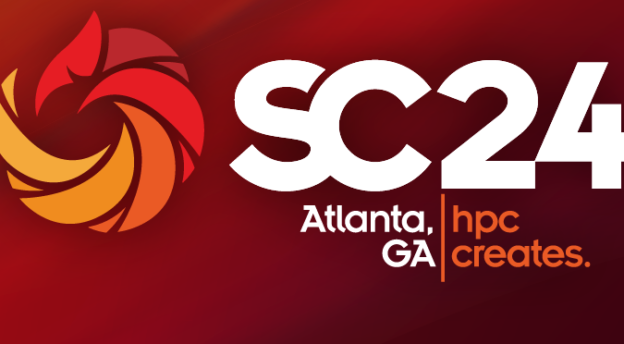The fantastic Supercomputing 2024 show is coming back to Atlanta this year. If last year was any indication, there will be plenty of coffee flowing and lots of discussions around power efficiency, storage, and the future of AI in HPC.
The good news is that the show will be zettascale-free. The operating term now is “post-exascale,” with technologies like chiplets and hardware-software codesign helping faster time-to-science. Many sessions at SC 2024 will focus on benchmarking and performance.
The Top500 list of fastest supercomputers in the world will be a highlight. The current list has two exascale systems, with two more waiting in the wings: El Capitan at Lawrence Livermore National Lab and Jupiter at Jülich Supercomputing Centre in Germany.
The big question: will they pass the exascale threshold? That will be a big boost for Top500, which has taken a hit recently with submissions declining and systems staying on the list for a lot longer. China hasn’t submitted benchmarks of their exascale systems.
 Will any system topple Frontier from the top? Aurora, which has Intel’s Ponte Vecchio GPUs, has a slim chance. Aurora’s theoretical peak is two exaflops, and a complete benchmark could push it to the top. The system failed to unseat Frontier from the top spot in the most recent Top500 list.
Will any system topple Frontier from the top? Aurora, which has Intel’s Ponte Vecchio GPUs, has a slim chance. Aurora’s theoretical peak is two exaflops, and a complete benchmark could push it to the top. The system failed to unseat Frontier from the top spot in the most recent Top500 list.
Experts expect El Capitan, which has AMD’s MI300A GPU, to ultimately beat Frontier to take the top spot.
Like every year, a Top500 session will discuss the 64th edition of the list and HPC trends. Turing Award winner and HPC legend Jack Dongarra will participate in that discussion.
HPC giants Nvidia and HPE are announcing news during the show. Nvidia didn’t make a splash at Supercomputing 2023 but was well-represented by partners. This year, it may be the same, and many Nvidia speakers are presenting in technical sessions.
This year’s keynote speaker is Nicky Fox, the associate administrator for NASA’s Science Mission Directorate. She will talk about missions conducted by NASA and the science behind them. She will discuss how supercomputing helped the space agency achieve its goals.
The keynote will also touch on AI’s role in NASA’s supercomputing infrastructure. Artificial intelligence is a top priority for scientific computing, reflected in the numerous sessions at this year’s SC 2024.
At ISC earlier this year, keynote speaker Kathy Yelick encouraged scientists to embrace AI and make it an equal participant in scientific computing, backed by high-precision computing. The technical sessions, student papers, and workshops at SC 2024 show AI is a big component in projects.
Time to science is a big theme at the show, with multiple sessions discussing benchmarking, especially for AI.
The “Future of Benchmarks in Supercomputing” session on Nov. 20 addresses a question plaguing Top500, with LINPACK performance hitting a wall and losing relevance. AI performance — in this case, with mixed precision — is becoming a more important benchmark in measuring system performance.
The session aims to foster debate for a new benchmark suite that keeps up with the new AI-inclusive reality of supercomputing. The session will include active Top500, HPCG, and MLPerf members, providing suggestions on the new benchmark for emerging applications. It will also provide guidance on evolving AI-centric system design.
Representatives from Nvidia, AMD, Microsoft, and Oracle will be talking about the importance of benchmarking AI systems to effectively exploit large-language models in a session titled “Benchmarking: A Key Driver for AI Innovation” on Nov. 19. The assumption is that AI performance is about hardware-software codesign, and re-iteration of LLMs will continually improve performance.
Another session, “Mixed Feelings About Mixed Precisions,” on Nov. 20, will discuss how the HPC audience could work with mixed precision. The session will talk about implementing mixed-precision into scientific workloads and define a mixed-precision roadmap going forward. The session is led by Hatem Ltaief of King Abdullah University of Science and Technology (KAUST) and includes participants from MIT and Nvidia.
Attendees will also get updates on new emerging technologies in HPC.
 The High Performance Software Foundation, a consortium formally established earlier this year to standardize HPC software technologies, will hold a BoF session on Nov. 19 to discuss its roadmap and plans. The intent to establish HPSF was announced at last year’s SC and made headlines. The group is part of the Linux Foundation.
The High Performance Software Foundation, a consortium formally established earlier this year to standardize HPC software technologies, will hold a BoF session on Nov. 19 to discuss its roadmap and plans. The intent to establish HPSF was announced at last year’s SC and made headlines. The group is part of the Linux Foundation.
It’s also good to see more HPC security sessions at this year’s show. Security has typically been a second-class citizen in HPC as it slows down system performance. A full-day session will address security for HPC systems, for which NIST is developing guidelines.
There have been incidents of hackers breaking into supercomputing systems and using HPC resources for Bitcoin mining. A session titled “HPC Security: Why the Time is Now?” on Nov. 17 will explain why security is needed for HPC systems. The session is led by MIT’s Lincoln Lab staff, which has prioritized security.
Non-x86 chip entities also have a presence. In recent years, ARM has caught on with cloud providers Microsoft, AWS, and Google, developing homegrown CPUs based on the architecture.
One ARM session will explain why the architecture- relatively new to HPC- is a good substitute for x86 in supercomputing. The session includes speakers from AWS, Nvidia, and RIKEN, whose Fugaku supercomputer is based on ARM architecture. Fugaku has won over fans for its elegant and power-efficient design.
 Like clockwork, RISC-V enthusiasts gather at every SC to share the progress of HPC’s open instruction set architecture. This year will be no different, with RISC-V enthusiasts saying the chip architecture is close to primetime.
Like clockwork, RISC-V enthusiasts gather at every SC to share the progress of HPC’s open instruction set architecture. This year will be no different, with RISC-V enthusiasts saying the chip architecture is close to primetime.
Observers believe RISC-V is many years away from making its mark in servers. RISC-V contributors are creating a server spec, and many new standards for high-performance computing were discussed at the recent RISC-V Summit.
A different session at SC 2024 focuses on agriculture and supercomputing. A 1.5-hour BoF session titled “Agriculture Empowered by Supercomputing” will highlight how supercomputing (conventional and AI) is improving crop production at farms and food distribution in the supply chain, particularly during disruptions such as wars. That helps maintain food security.
HPCwire will also be announcing the Readers and Editors Choice awards at the show.
Top500 Wild Cards Could Add Thrills to Supercomputing 2024 Show





